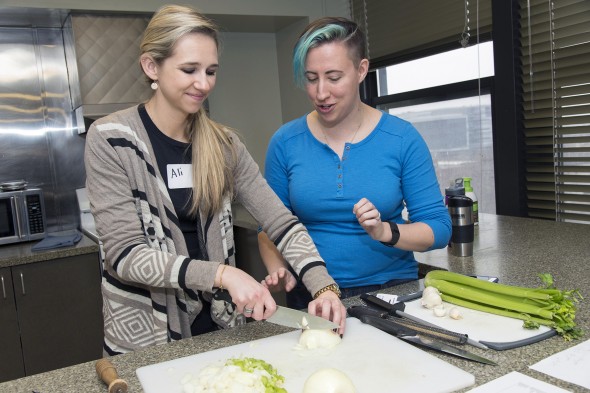Doctors’ orders: prepare healthy, inexpensive meal

Ali Melnyk (left) and Theresa LaMont prepare a healthy meal during a College of Applied Health Sciences cooking demonstration. — Photo: Roberta Dupuis-Devlin
The fourth-year medical students carefully review the day’s assignment, readying themselves to begin formulating a treatment plan. Should they brown the ground beef first or start by sautéing the onions?
Are these future doctors or chefs?
The 24 students are learning to cook a delicious nutritious meal so they can assist their patients in leading a healthy lifestyle. The cooking demonstration in the kitchen at the College of Applied Health Science was part of a full-day event designed to address the lack of nutrition education at the College of Medicine, said Joanna Michel, associate director of the Urban Medicine Program.
The day fits well within the context of the Urban Medicine Program’s larger mission “to prepare physician leaders to serve urban, underserved communities,” Michel said. Along with being flavorful and nutritious, the recipes were budget friendly, feeding a family of four for less than $10.
“The cooking workshop is evidence- based and hands-on, which seemed like the most effective way to not only educate physicians to address the issues of their patients, but also to improve their own nutrition and eating habits,” Michel said.
The students were divided into four groups, each tasked with cooking a spaghetti entrée. One version contained a meat sauce, and another combined meat and vegetables. A third had ground beef with lentils, and the fourth was made strictly with lentils.
“It’s no surprise that people have a basic lack of knowledge when it comes to food,” said Zahra Kasza, a licensed registered dietician and former restaurant owner who led the cooking demonstration. “There is so much confusing and often contradictory information out there.”
During the demonstration, Kasza told students that a major reason why people rely on convenience foods is because of time constraints.
Kasza recommends those with hectic lifestyles to schedule two days a week to “meal plan,” normally Sundays and Wednesday, to prepare large quantities of nutritious meals that can last a few days.
The culinary course provides the physicians with a “level of legitimacy when we suggest to patients how to make healthy foods,” said medical student Nathaniel Meadow.
“Patients can tell when someone is quoting from a textbook versus sharing from an educational experience, and information rooted in experience has a much greater chance of being adopted by the patient,” he said.
As a fourth-year medical student, Meadow said he has little time to cook at home but enjoys preparing meals.
“I learn a lot more from interactive courses, as I remember the techniques better,” he said. “The course was fun, and the food was very tasty.”
The task was led by Carol Braunschweig, associate professor of kinesiology and nutrition, and Terry Unterman, an endocrinologist for the University of Illinois Hospital and Health Sciences System.
